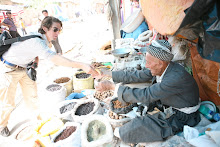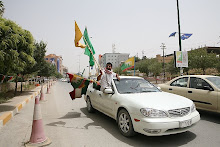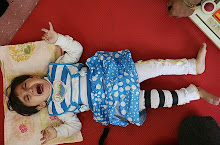Misrata is a City in tatters. Every street has been shelled, every house has been hit and every road has craters in it. It is a charred and blackened city engaged in such fierce fighting that it is hard to know which images to share, or what stories to tell, so extensive is the damage and the destruction. It is hard also to describe the feeling in a city that is torn between pride for its revolution and a sinking dread as the situation deteriorates.
Quadaffi has the city surrounded and besieged and resources are dwindling. The queues for gas stretch round the block (as do the ones for cigarettes) and food is mainly limited to tuna, bread and rice. The only access now is through the port, and this too has been under bombardment for the last few weeks. We arrived ourselves 24 hours after leaving the relative peace of Benghazzi in the dead of night and on a boat laden with antiquated RPG’s, grenades, ammo and missiles, though claiming that our cargo was “for the children”. We only just made it through the NATO blockade. This influx of weapons, stored even in the shower room, the engine room and the galley, when pitted against the heavy and advanced weaponry of Quadaffi will not stop the bombardment.
Walking around the streets it is impossible not to tread on bullets, mortar casings, rubble, broken glass or in blood and smoke hangs in the air - it is sheer chaos. The bodies of Quadaffi troops lie rotting on the ground and the stench can be overbearing. Buildings crumble around you and bullet ridden or bombed out cars and tanks litter the city. The hospital is low on medicine, doctors, and has run out of beds, so a tent has been set up in the parking lot to deal with the overflow. The morgue is a refrigerated lorry used usually for food and a trail of blood leads towards it.
The sounds here are as varied and imposing as the sights. Rockets, cluster bombs, mortars, heavy artillery, sniper fire, NATO planes and the eponymous Kalashnikovs can be heard night and day, alongside cries of Allah Akbar and sirens. The walls shake even in the basement where we are staying, but this has become such a constant that it’s barely noticed. At night the press gather on the roof to watch NATO bombs and tracer fire light up the sky. There’s little rest here, and as the battle rages constantly, exhausted fighters and doctors are replaced by new ones either arriving at the port or from among the 300,000 men who have stayed.
The two ‘armies’ are so close that it is never easy to know who is firing and it is easy to become caught in a crossfire. I say armies, but these battles are always between groups no larger than 100 and often as small as 10 and they spring up in different parts of the city without warning. They are also such a rag tag lot that armies might be an overstatement. Often the rebels fire at each other because of the lack of communication between them, and I have seen them run in front of each others guns and fire RPG’s in a crowd. If they need to contact NATO they must call the council in Benghazzi 240 miles away who then pass on the request. This is no way to fight a war, and yet they know no other way.
The sad loss of 2 experienced war correspondents last week is testament to the danger, and very few journalists now remain. Crossing each road involves a mad dash to find cover and often you may only be a street away from Qadaffi’s forces and bullets pepper the walls around you.
Quadaffi however has stopped short of sending in large numbers of ground troops, preferring instead to bomb and shell while sending in small teams to harass the rebels. His tanks have been hit by precision NATO bombs when they enter the city, so he is forced to remain in the outskirts while starving it and destroying it. He is also afraid of large numbers of his troops deserting, so keeps the numbers small.
Another reason that his troops are reluctant to enter the city is that Misrata is a twisting web of small and intertwined dirt roads. The rebels know these like the back of their hands and are therefore able to outmanoeuvre Qadaffi’s troops and surround them. They have knocked through walls between houses and gardens and we have run with them as they dart from street to street, roof to roof, encircling his forces. Snipers now pose the greatest danger and he places them wherever he can. Occasionally a bullet will whistle past and everybody will hit the ground, last night a French journalist was hit in the neck by a sniper only 100m from where we are staying, and it appears he will be paralysed for life.
Much has been written in the media about the use of mercenaries, however there are as many Libyans fighting for him here. They are uneducated and bitterly poor so both believe Quadaffi’s propaganda but are also willing to accept his huge sums of money. We have also been told that mercenaries have orders to shoot any defectors, and many people have told us of families being held hostage in Tripoli. At the same time, the punishment for helping the rebels if caught are beyond belief. I have seen a video of a boy no older than 10 years old who had had a 6 foot metal spike inserted into his anus until it came out of his shoulder – he was still alive, and his crime had been to deliver water.
I had the chance to briefly interview a Qadaffi fighter who had been taken to the hospital. Having leapt into his van as it left I was quickly able to ask why he fought for Qadaffi and why he fought against his own people – he claimed he had been told that he was fighting foreigners, that he believed the rebels were the invaders and that he was protecting his country. Whether this is true or not I do not know, however he was terrified and I don’t know what happened to him. One person has told me “We kill all quadaffi soldiers, we have no time to take care of them”, but everybody else claims they are in a secret location – we have not been allowed to see them.
There is also evidence also for the presence of mercenaries. One pilot who defected had previously been asked to fly south and pick up a planeload from Chad. In another case, a truck was found full of Serbian fighters – 180 of them. Apparently the truck refused to stop and they were all killed. I have also seen numerous passports from Chad, Sudan and Mauritania so there is no doubt this is true.
Mercenaries are not the biggest concern for the rebels though. Many suspect that Quadaffi troops may have infiltrated the civilians who remain and may be waiting to counter atttack. Countless military license plates have been found discarded, presumably swapped for civilian ones and uniforms are also in many buildings. Every few streets checkpoints have been set up to identify possible enemy fighters but quite how they intend to pick them out is unknown.
Last night at about 12.30 Qadaffi forces began shelling the city from an airfield about 15km away. They indiscriminately targeted residential areas, and his bombs killed whole families as they slept. We watched as body after body arrived at the hospital, and in total 31 men, women and children died. Some were torn apart by the blasts, and others burnt beyond recognition. Dismembered body parts were laid out on the floor next to the bodies, and as people cried out in anguish, the measures to which Qadaffi will go became very apparent. Throughout the night ambulance after ambulance arrived and as one mother wept inconsolably by the body of her dead son the crowd outside began chanting to the heavens. They continued all night but could not drown out the explosions around us.
This morning we walked through streets and buildings where the bombs had dropped. Whole houses were destroyed, their kitchens and bedrooms caved in. Blood marked the spots where many had died and charred remains lay in the street. The area was very poor and families who had little to start now have nothing at all. There is no longer any doubt that Qadaffi is willing to do whatever it takes to regain this city, and every time it appears things the situation can get no worse it does.
At the moment Quadaffi is on the back foot inside the city; he can’t get a stronghold in the centre, but this means little when he continues to bombard with his huge aresenal of weapons and continues to starve the people. The humanitarian situation here is dire and unless the blockade is broken soon it will get a lot worse, as this is the only main city in the West of Libya to be held by rebels; if it falls, much hope will fall with it.














































